Vestibular disorders (vestibulopathies, vertigo, dizziness) are a fairly common pathology that occurs in both men and women. Dizziness and weakness with normal blood pressure can occur for various reasons. First of all, the doctor excludes pathologies of the inner ear. The main ones are Meniere's disease, benign paroxysmal positional vertigo, infectious and autoimmune diseases of the inner ear, and migraine headaches.
Vestibulopathies can appear due to atherosclerotic damage to blood vessels (usually vertebral arteries), heart pathologies and arrhythmias, disturbances of innervation, blood supply to the inner ear and brain (pinched nerves at the level of the cervical spine due to osteochondrosis, neck trauma, pinched nerves or hernia of the thoracic spine). Vertigo is caused by anemia and low blood sugar levels (in diabetics). The cause of dizziness can be brain tumors, poisoning with poisons and drugs, and vegetative dystonia.
Relevance of the problem, concept, classification of vestibulopathies, causes of pathology, clinical manifestations
The relevance of the topic of dizziness is that the symptom can hide serious illnesses. Delayed diagnosis often leads to worsening of the condition and progression of a hidden disease (for example: a brain tumor). Vestibular disorders greatly impair the quality of life. They can lead to injuries when falling and other consequences, so any manifestations of vertigo require the attention of a doctor.
Vestibulopathies are conditions that are accompanied by a false subjective sensation of body movement (rotation, translational movements in any plane) and objects in space. The disease occurs in 2–5% of cases (if we count the frequency of all reasons for visiting a doctor). Often the pathology is accompanied by loss of consciousness, fainting, as well as nausea, vomiting and other symptoms. Dizziness can have various causes depending on which it is divided into groups.
Classification of vestibular disorders:
- Systemic. Peripheral.
- Central.
- Conditions before fainting.
Systemic vertigo is the result of poor performance of the vestibular analyzer. Systemic vestibulopathies are divided into peripheral and central. Peripheral vertigo is most often caused by damage to the vestibular ganglia, semicircular tubules of the balance analyzer. Central vestibulopathies can be provoked by pathology of the cerebellar structures, brain stem (damage to the nuclei or nerves).

In the presence of systemic vertigo, patients note passive movement of their body in space. Patients complain of imaginary tactile-tactile sensations (movements of the support of the arms or legs, raising or lowering the body, rocking the body as if on waves, moving the body in the vertical and horizontal plane, a feeling of an uneven surface (the patient walks over bumps)). Patients also note the presence of visual illusions, which are manifested by the movement of objects in space.
Patients with a non-systemic type of vestibulopathy complain of difficulty walking and poor coordination of movements while performing any work. Non-systemic vertigo is often accompanied by nausea and a sensation that precedes loss of consciousness. In this case, the patient does not feel rotational movements of the body or objects around (walls, ceiling, furniture, etc.). Vestibulopathies of a psychogenic nature are observed in patients with anxiety and depression.
Physiological vestibular disorders appear with strong stimulation of the vestibular analyzer. With a sudden start of movement, long rotations, after observing objects in motion, the patient notes a feeling of motion sickness, nausea, and vomiting. Physiological vestibulopathies include kinetosis and motion sickness.

Causes and manifestations of systemic vestibulopathies
Systemic vestibular disorders are observed in 35-50% of cases. They are caused by damage to the structures of the brain tissue, the vestibular organ itself, and the vestibular nerves. Brain damage is more often observed with injuries, vascular diseases, and organic lesions of brain tissue.
Causes of systemic vestibulopathies at normal pressure:
- Vestibular neuronitis (usually infectious).
- Meniere's disease.
- Benign paroxysmal positional vertigo (BPPV).
- Neuroma of the VIII pair of cranial nerves.
- Head injury.
- Intoxication causing damage to the vestibular organ.
- Temporal lobe epilepsy.
BPPV is a common pathology that provokes systemic vestibulopathies. It is caused by the accumulation of calcium carbonate aggregates in the cavity of the semicircular tubules (vestibular analyzer). These formations strongly irritate the receptor apparatus of the internal mucosa of the tubules. A patient with BPPV experiences brief (less than 60 seconds) flashes of dizziness. They often begin with a sudden change in head position. An accompanying symptom of vertigo is nausea, weakness, slow pulse and other manifestations of autonomic dysfunction. A specific sign of BPPV is the absence of ringing in the ears.
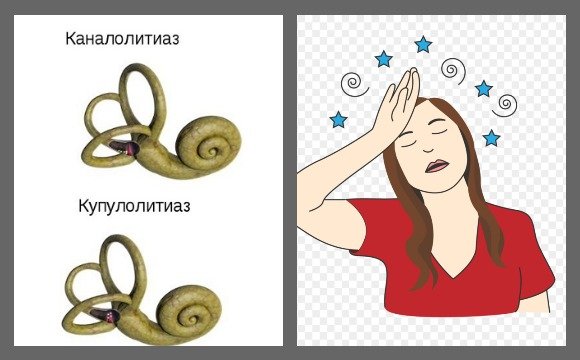
Vestibular neuronitis is manifested by prolonged dizziness (several hours or several days). Clinical manifestations of the disease occur acutely. Most often the provoking factor is an infectious disease (viral or bacterial). The patient experiences severe vertigo, which is accompanied by autonomic disorders. With neuronitis, there are no focal neurological symptoms. The patient's hearing function is not impaired.
The cause of dizziness at normal pressure can be a traumatic injury to the head. Vertigo in patients with traumatic brain injury often occurs a few days after the injury. This can be explained by the appearance of the serous labyrinth.
Vertigo also appears due to toxic effects on the vestibular organ. Aminoglycosides and other drugs can disrupt the functioning of the balance organ. Patients experience poor coordination caused by severe dizziness.
Vetibulopathies may occur in patients with Meniere's disease. The cause of the pathology is an increase in the amount of endolymph in the cavity of the vestibular tubules. Excessive pressure on the walls of the tubules leads to irritation of the receptor apparatus. Patients complain of tinnitus, hearing loss, autonomic disorders, and sometimes vomiting. The attack of dizziness is prolonged, lasting from 2-3 minutes to 24 hours. Attacks of vertigo can appear from 2-3 times a day to 1 time a year. As the disease progresses, the patient's hearing deteriorates, but its complete absence is not observed.
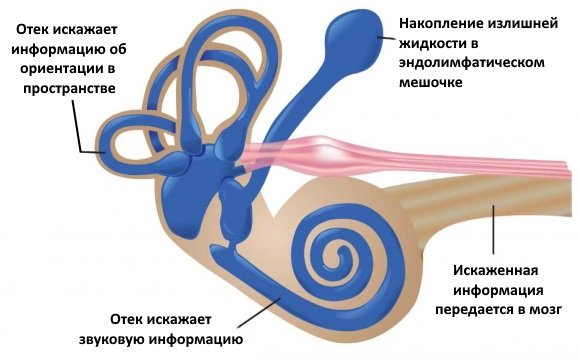
One of the causes of systemic vestibulopathy is considered to be temporal lobe epilepsy. It is manifested by regular attacks of vertigo, which are accompanied by nausea, pain in the projection of the stomach, and slow heart rate. Patients experience visual illusions and misperceptions of what they see.
Causes of dizziness in men
Men tend to remain silent and brush aside the problems that bother them, especially at the young age of 30-40, but if you do not pay attention to dizziness at this age, after 10-15 years a number of serious diseases and problems can be diagnosed, which will take twice as long to fight more difficult.
- seasickness, motion sickness in transport, which can occur, including among drivers, people who spend a lot of time behind the wheel, in this case, dizziness is also accompanied by nausea and vomiting;
- insufficient oxygen supply to brain cells, deterioration of blood circulation;
- traumatic brain injury;
- psychogenic factors: depression, stress, phobias;
- frequent consumption of strong, alcoholic drinks;
- poor nutrition, long gaps between meals.
The definition of anxiety symptoms is not excluded in the male body. More often, the older generation suffers from dizziness, and the symptom can be noticed after 35-40 years. Effective treatment is possible only after a preliminary diagnosis, otherwise the general condition will not improve even with systematic use of medications.
- impaired cerebral circulation;
- traumatic brain injury;
- encephalitis;
- multiple sclerosis;
- a brain tumor;
- suffered a stroke;
- general intoxication of the body.
Etiology of non-systemic vestibular disorders
Non-systemic vestibulopathies include balance disorders and conditions on the eve of fainting. Changes in balance are often caused by improper functioning of the vestibular organ. The main sign of dysfunction of the organ of balance is the loss of control by the organ of vision as the patient’s condition worsens (the eyes close). The balance is disturbed by damage to the cerebellar structures, subcortical nuclei, brain stem, changes in the functioning of all sensory organs, as well as by the use of medications (benzodiazepine and phenothiazine derivatives). If medications are the cause of vestibulopathies, the doctor simply reduces the dose or discontinues the drug.
Presyncope is often caused by heart disease. The patient experiences darkness in the eyes, a feeling of lightheadedness, nausea, and loss of balance. The psychogenic variety of vertigo is provoked by panic attacks, hysteria, depression, and stressful situations. The clinical picture of the disease is very bright and persistent.
Distribution of causes of vestibular disorders by gender
The causes of vestibulopathies may vary depending on gender. This is due to the predisposition of different sexes to certain diseases. Women and men have different lifestyles and habits. They can influence the occurrence of chronic diseases and the appearance of dizziness.
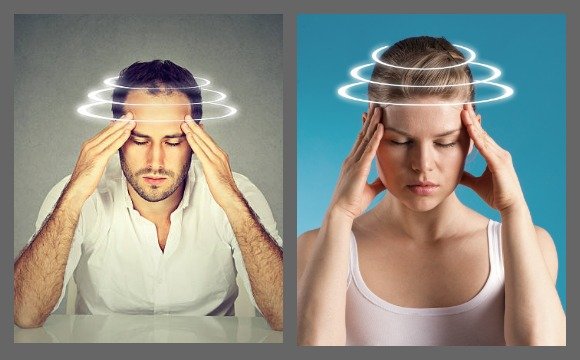
Causes of vestibulopathies in women
In adolescent girls, vestibular disorders may occur during puberty. In girls aged 12-16 years, blood pressure is normal, but there is a sharp hormonal change. In patients under 12 years of age, dizziness is caused by increased fatigue, ear diseases, somatic pathologies, and poisoning.
Causes of vestibulopathies in female patients:
- Lack of animal food in the diet, long-term diets, fasting.
- Stressful situations.
- Deficiency of vitamins and microelements.
- Migraine headaches.
- Heavy menstrual bleeding.
Vestibular disorders in women of childbearing age may occur during pregnancy. As pregnancy progresses, the uterus enlarges and puts pressure on large vessels. This leads to dizziness. Pregnancy, especially at its initial stage, may be accompanied by hormonal changes that cause vertigo. During pregnancy, patients experience nausea and dizziness in the morning.
If attacks of dizziness in a pregnant woman, accompanied by vomiting, persist for 45 minutes, an ambulance should be called.
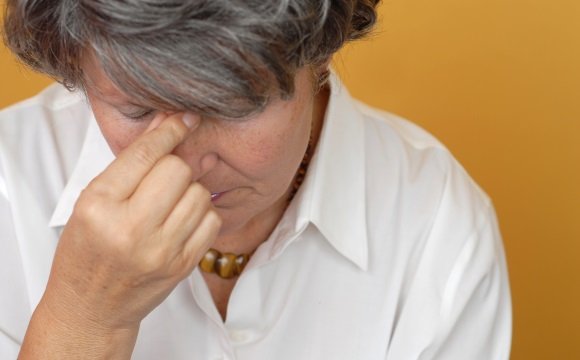
In patients over 40 years of age and elderly women, vestibulopathies may appear due to:
- Migraine headaches.
- Diabetes.
- Psychiatric pathologies.
- The presence of tumor formations in the brain.
- Multiple sclerosis.
- Ischemic damage to brain tissue and vestibular organ (due to atherosclerosis and other diseases).
- Vegetative dystonia.
- Ear diseases.
- BPPV.
- Anemia.
- Thyroid dysfunction.
- Vestibular neuronitis.
In diabetes mellitus, vertigo often occurs due to low blood sugar levels due to improper correction of glucose levels. Migraine pain provokes dizziness due to impaired permeability of the vascular wall. This leads to a deterioration in blood supply to the brain, and sometimes to the vestibular apparatus. Multiple sclerosis can lead to vestibular disorders by deteriorating the innervation of the inner ear. Vegetative dystonia at normal pressure may be accompanied by dizziness due to changes in heart rhythm, as well as vasospasm. Vestibular neuronitis is accompanied by vestibulopathies due to infectious damage to the inner ear.
Etiological causes of vestibular disorders in male patients

Why does vertigo appear in male patients? In men, vestibular disorders are provoked by tumor and ischemic brain lesions, and traumatic brain injuries. Vestibulopathy often occurs due to alcoholism, encephalitis, and diabetes. Vertigo can develop due to toxic damage to the brain and vestibular organ from drugs and toxic substances (when working in hazardous industries). Very hard physical work can also contribute to dizziness in men.
Causes of dizziness in women
Human nature is structured in such a way that men work with their hands, and women work with their minds, and this is not surprising, because males have greater strength and endurance, and women, as a rule, are more intelligent and intellectually developed.
Therefore, impulses travel to parts of the body in different ways, receptors work at different speeds, and the causes of dizziness in men and women may differ.
- oxygen starvation of the brain;
- motion sickness, seasickness;
- vitamin deficiency, especially in the autumn/spring periods;
- serious hormonal imbalances can cause frequent dizziness, accompanied by nausea and possibly vomiting;
- abuse of diets, due to which the body receives less or does not receive vital and necessary elements at all;
- pregnancy, postpartum period, lactation, menstruation, menopause;
- psychological factors, neuroses, stress...
The manifestation of such a symptom is more often characteristic of the fairer sex. False vertigo is caused by progressive pregnancy, motion sickness in transport, seasickness, and sudden changes in atmospheric pressure. Since women are mostly weather-dependent, any weather changes can cause instability of the vestibular system at normal pressure. Other causes of dizziness in women that are already pathological in nature are presented below:
- inflammatory process of the inner ear;
- Meniere's syndrome;
- premenstrual syndrome;
- neuritis;
- pinched nerve in the cervical spine.
If such an unpleasant condition appears again and again, it’s time to pay attention to the health problem. It is possible that this symptom is associated with an internal disease of the body, which is not at all associated with hypertension. Disturbed systemic blood flow provokes oxygen starvation, congestion, and requires immediate correction with medications. The following provoking factors are classified as causes of frequent dizziness in women:
- vegetative-vascular dystonia;
- suffered a stroke on the legs;
- phlebeurysm;
- disease of the myocardium and hematopoietic organs;
- hypotension.
In a young body, this symptom may also occur. More often it disappears on its own, requiring medication and medical attention. The causes of mild dizziness in women lie in the individual characteristics of the body and are the result of overwork or chronic insomnia. If you are constantly nervous or lift heavy objects, the balance of the vestibular apparatus is also disturbed at one moment. Whatever the causes of dizziness with normal blood pressure in women, it is better to consult your doctor in a timely manner.
At this age, the patient is already faced with true vertigo, when acute pathological processes occur in the body. Such changes may be accompanied by hormonal imbalance, its restructuring, and the approach of menopause. Internal sensations change radically, and dizziness is a frequent companion of everyday life.
- multiple sclerosis;
- basilar or other form of migraine with aura;
- syringobulbia;
- acute circulatory disorder in the brain;
- hemorrhage in the cerebellar area;
- acoustic neuroma;
- transient ischemic attack;
- vestibular neuronitis;
- mental illness;
- brain stem tumors;
- Arnold-Chiari malformation;
- endocrine pathologies.
The patient must remain under strict medical supervision, and the help of medications is welcome. It is important to undergo a detailed diagnosis, since the problem may be classic chronic fatigue. If you go through a crisis period of 40 years, which lasts not a single week, the general well-being of an adult woman will stabilize.
Diagnostic measures
If you experience dizziness, you should definitely consult a doctor. At the initial stage, patients come to the therapist. The therapist collects an anamnesis, conducts an examination, prescribes additional examination methods, identifies the main cause of vertigo, and then refers the patient to a specialist (neurologist, otolaryngologist, endocrinologist).
Actions of the therapist during the initial diagnosis of vestibulopathies:
- CBC (excludes or confirms the presence of anemic syndrome, infectious disease, chronic inflammation);
- blood glucose level (diabetes diagnosis);
- tests to diagnose dizziness;
- electrocardiography (detects or excludes heart pathologies and arrhythmias).
Subspecialists carry out a more detailed examination with tests for vestibular disorders (rotational movements, stabilography, vestibulometry). Doctors perform audiometry, electroencephalography of the brain, radiography of the spine or skull, computed tomography or magnetic resonance imaging. The type of examination is chosen by the doctor depending on the clinical picture of the disease and medical history.
Treatment of dizziness

It is difficult to live with such an unpleasant feeling. To permanently eliminate dizziness at normal blood pressure, it is recommended to select a set of medications to eliminate both the root cause and the symptoms of the characteristic illness. A person should rest more, eat right, lead an active lifestyle, and be less nervous.
- Betaserc or Betahistine;
- Diphenhydramine and Motilium;
- Scopolamine and Cinnarizine.
The choice of treatment method depends on the nature of the disease state. Regardless of the etiology of the unpleasant symptom, you need to be able to provide first aid to a person suffering from such disorders.
If dizziness occurs, you should:
- Lay the person on a horizontal surface, place a pillow or low cushion under the head so that not only the neck and head are placed on them, but also the shoulders - to avoid squeezing the artery.
- Free your neck from constricting clothing (unbutton the top buttons of your shirt, remove a sweater with a tight neckline).
- Ventilate the room.
- Place a bandage soaked in cold water on your forehead.
- If possible, measure pulse and blood pressure and, if necessary, take measures to stabilize them.
- If the condition does not return to normal for a long time or other dangerous symptoms appear, for example, repeated vomiting, call an ambulance. Doing anything before the doctor arrives (giving specific medications, abruptly changing body position) is not recommended.
Drugs
The choice of remedy for dizziness depends on what caused the painful condition and what other symptoms it is accompanied by.
- For pathologies of the inner ear and disorders associated with the vestibular apparatus, anti-inflammatory, antiemetic, sedatives, neuroprotectors, as well as drugs for the treatment of vestibular disorders are prescribed, depending on the type of disease.
- Dizziness caused by migraine is treated with painkillers, sleeping pills, and caffeine-containing substances.
- For anemia, iron supplements, folic acid, and vitamin B are indicated.
- Hypoglycemia is treated comprehensively, taking measures to eliminate the underlying disease of which it is a symptom. A quick effect comes from eating foods containing simple carbohydrates.
Folk remedies
Homemade recipes to combat dizziness include tincture of eleutherococcus and ginseng. They are used for both treatment and prevention.
Periodically occurring dizziness is treated with lemon balm decoction; for this, dried leaves are taken in the amount of one teaspoon, poured into a glass of boiling water and drunk as tea.
Gymnastics
For prevention and treatment, gymnastics is performed. Exercises can help in cases where the described ailment is caused by osteochondrosis of the cervical spine or disorders of the vestibular apparatus.
You can choose the appropriate exercises by consulting a specialist in the physical therapy room.
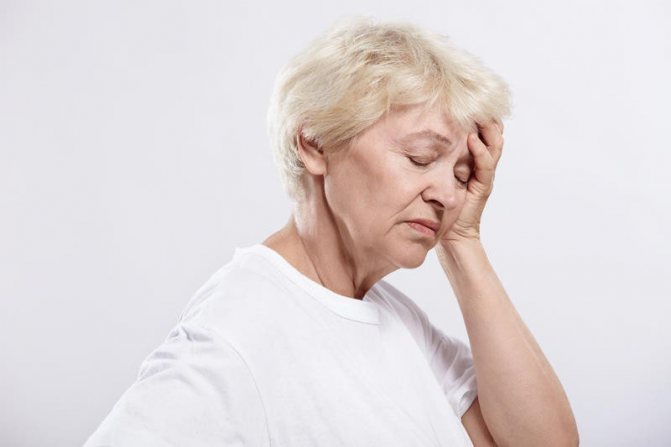
Correcting your diet can relieve dizziness if it is caused by hypoglycemia, diabetes, migraine or anemia. In each specific case, the doctor will suggest an appropriate diet that will help treat the underlying disease.
If you have a migraine, it is advised to avoid chocolate, high-fat cheese, nuts and fish.
For anemia, it is recommended to enrich the diet with iron-containing foods. Preferably red meat, offal, seafood (mussels, shrimp, oysters), dried porcini mushrooms, legumes, spinach, carrots, potatoes, dried apricots, raspberries, apples. At the same time, iron is absorbed from plant foods much worse.
A diet for diabetes mellitus involves split meals with the exclusion of sugar-containing products, with a significant limitation of smoked, salty, hot and spicy foods, and alcohol.
The best hope for treatment success lies in response to causative therapy. But it is not always possible to determine the cause of the disease. In this case, symptomatic treatment is carried out (elimination of symptoms of the disease), a combination of various therapeutic methods is used, including a number of approaches, including:
- medicinal;
- physiotherapy;
- surgical;
- psychotherapeutic.
Many forms of acute dizziness of peripheral origin are characterized by a spontaneous course with compensatory mechanisms. These mechanisms are often supported by medications, targeted rehabilitation, and folk methods.
A separate chapter is the use of some antivertiginous drugs. Their mechanism of action is to suppress the correct function of the equilibrium apparatus. These drugs include:
- Metoclopramide;
- Moxastine;
- Embramin;
- Dimenhydrinate;
- Thiethylperazine;
- benzodiazepines, etc.
These medications provide symptomatic relief of troublesome concomitant autonomic symptoms. But when taken for several days, they are harmful and can even cause decompensation of the condition. Therefore, it is recommended to pause treatment, taking the drugs for a maximum of 3 days. Sometimes such therapy is extended to 7 days.
Of particular importance is Betahistine, the use of which leads to an increase in blood flow in the arterioles of the inner ear. The drug does not have a sedative effect; its effect appears after a few days or weeks. The duration of treatment increases the preventive effect of Betahistine (at its full therapeutic dose) in reducing the frequency of dizziness attacks, its intensity, and duration.
Management of patients with vestibular disorders
First aid for vestibular disorders is of great importance. The correct behavior of a person when attacks of dizziness occur will help to avoid serious consequences. When vertigo appears, the patient should immediately sit or lie down. This will prevent unwanted falls. It is mandatory to take medications (tablets) prescribed for dizziness. If symptoms intensify and continue for 45 minutes, you should call an ambulance.
Treatment of vestibular disorders is primarily aimed at the disease that caused the dizziness. Drug-induced vestibular disorders require dosage adjustment or drug discontinuation. Dizziness caused by diabetes mellitus is treated with blood glucose-correcting medications and diet therapy (low glycemic index foods).
Therapy for BPPV includes special exercises. The deposits that are located in the tubules of the vestibular apparatus begin to move during tilts and turns of the head. If exercises do not help, the patient may undergo surgical treatment. The surgeon blocks the area of the analyzer responsible for the development of vestibular disorders.
Infectious lesions of the inner ear (including vestibular neuronitis) are treated with antibacterial and antiviral drugs. To reduce the activity of the nervous system, the patient is prescribed benzodiazepines, antiemetics, and acetylcholine inhibitors. Glucocorticosteroid drugs are indicated to relieve inflammation and swelling.
Meniere's disease cannot be completely cured, so therapy is aimed at alleviating the patient's condition. The patient is taking antiemetics and benzodiazepines. These medications help reduce the intensity, duration, and frequency of dizziness. To reduce fluid pressure in the cavity of the vestibular tubules, diuretics are prescribed.

Correction of anemic syndrome is carried out with the help of iron supplements (Sorbifer, Fenyuls). If anemia is very severe, red blood cells are used. Migraine is treated with anti-migraine drugs and painkillers.
Autoimmune pathologies of the inner ear require suppression of the immune system. For this purpose, glucocorticosteroid hormones and cytostatics are prescribed. The choice of drug depends on the severity of the pathology.
Psychogenic dizziness is treated with antidepressants. If a patient's dizziness is caused by ischemic brain damage, then nootropic drugs (Actovegin) and vascular drugs (Trental, Cavinton) are prescribed. For vegetative dystonia accompanied by vestibular disorders, Persen, Novo-passit, and Valerian extract are prescribed.
Surgical treatment is carried out if conservative therapy does not help. Patients can undergo dissection of the vestibular nerve, labyrinthectomy, laser destruction, tumor removal, and insertion of a vestibular implant. The operations are performed by neurologists and otolaryngologists. Sometimes the assistance of an ophthalmologist is required during surgery.
Traditional medicine suggests using:
- Infusion based on lemon balm.
- Hawthorn tincture.
- Tea with honey and apple cider vinegar.
- Massage.

Before using traditional medicine recipes, you need to consult a doctor to clarify the cause of the disease. This will help prevent complications from taking herbs.
Diagnostics
Diagnosis is based on determining the cause of what causes dizziness at normal blood pressure. This requires a history and a simple neuro-otological examination. Often these measures are sufficient to distinguish the origin of vertigo (in the peripheral or central vestibular apparatus).
Dysfunction of the vestibular system is manifested by a combination of the following symptoms taken into account in the diagnosis:
- perceptual (dizziness);
- ocular (nystagmus, lack of equilibrium reflex);
- postural (ataxia - imbalance);
- vegetative (nausea, vomiting).
A condition in which dizziness occurs at normal blood pressure is diagnosed by an ENT specialist in collaboration with a neurologist. If the examination shows a neurological origin of the disorder, it is usually accompanied by CT or MRI studies, which help pinpoint the processes occurring in the brain. For example, it is possible to detect a sudden stroke, a tumor, or the consequences of an injury.
Dizziness caused by imbalances as a result of a disorder of the inner ear system is not fatal, although it is very unpleasant and irritating. Its common cause is a blockage of the cervical spine, which can be eliminated with the help of medications, massage, and physiotherapy.
Balance disorders with a neurological cause may indicate a serious illness. If the problem is caused by a stroke, only the consequences are eliminated. In the case of an operable brain tumor, neurosurgical intervention is prescribed.
Sometimes, based on the time factor (duration of the symptom), it is possible to predict a nosological unit.
| Duration | Nosological unit |
| Seconds | Brief dizziness |
| minutes | Short-term deficiency of blood supply to the equilibrium apparatus of the brain |
| Watch | Meniere's disease, basilar migraine |
| Days | Inflammation of the equilibrium nerve, damage to the labyrinth (head injury), fracture of the temporal bone |
| weeks | Disturbance of the brain's equilibrium center, multiple sclerosis |
If you are worried about severe dizziness, its causes at normal blood pressure can be very different; to draw up an adequate treatment plan, you must consult a specialist. With this problem, you should come to an appointment with a neurologist, who will conduct a full examination, including the necessary tests and diagnostic studies, and, if necessary, refer you for a consultation with an otolaryngologist.
Self-medication can be very dangerous, since without a correct diagnosis, the use of any therapy methods can lead to complications of the existing disease. And if, with low blood pressure, it should simply be increased in order to feel improvements, and if it is high, it should be lowered, then with normal levels, it is extremely difficult to find out the real cause of dizziness without a doctor.

It is worth understanding that dizziness itself is not cured - as a result of the examination, the disease that caused this condition is revealed, and therapy is aimed specifically at treating the disease. And what kind of treatment will help depends on the pathology itself. Thus, for osteochondrosis, physiotherapy and medications with a vasodilating effect are prescribed, and psychogenic dizziness is often treated with antidepressants.
Why exactly you feel dizzy at normal blood pressure can only be answered by a specialist - there are many reasons for this condition. There is no need to panic - the vast majority of diseases that cause it are curable, or they can be stopped. It is worth understanding that normal blood pressure readings do not indicate absolute health, so dizziness can indicate serious pathologies that require immediate treatment.
Dizziness can be either the primary, sole, or secondary symptom.
It is impossible to judge the seriousness (or non-seriousness) of a condition by this criterion alone. If a person experiences vertigo for several days in a row, this is a sure sign that he should see a doctor without delay, even if there are no other symptoms.
To identify the causes of dizziness, the patient should consult a neurologist. The doctor will do a Dix-Hallpike test, a test for the integrity of the vestibulo-ocular reflex and other instrumental studies (if necessary) - posturography, a rotating chair.
In addition, tests are prescribed:
- Complete blood count, glucose level, biochemistry.
- Electrocardiogram.
- X-ray or CT scan of the cervical spine.
- Vascular examination.
- MRI of the brain (if there is a suspicion of tumor processes).
At an appointment with a general practitioner or neurologist, the patient should be prepared to describe in detail all the sensations that accompany dizziness. Subjective feelings will help the doctor make the correct diagnosis.
The specialist will also ask a number of clarifying questions to clarify the provoking component. It is also important what stops an attack of dizziness (food, fresh air or a sip of water).









